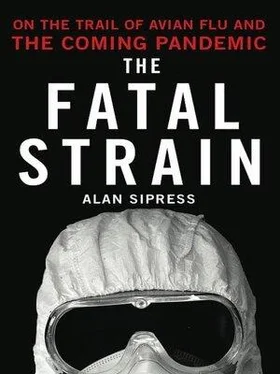Chan told the president it was vital for China to disclose its outbreaks and share samples. She urged him to speed up the process of providing specimens to WHO. She pressed the same points with Premier Wen Jiabao.
“The president and premier have a very good understanding of the potential impacts, on the health of the people, and also on the economy,” Chan told me later. “They understand the importance of being transparent.” In meetings with the leaders, she had made sure to praise China for strengthening its disease monitoring system since SARS. But she also reminded them that the country still had a hard time staying on top of emerging threats in the provinces. “China has a challenge, being a vast country,” Chan continued. “The importance is to make sure that policies go down to the lowest possible level so that the implementation is not impeded.”
That point was not new for either Hu or Wen. “They understand the challenge,” she put it to me. “But you know…” Her voice trailed off. It was a tacit acknowledgment of her own doubts about the potential for change.
After she exited the meeting in the Great Hall of the People and was asked by waiting reporters about the prospects for cooperation between China and her agency, Chan offered a diplomat’s assessment:
“We will have to look at the actual situations, but we all agree with it in principle.”
In one of Chan’s first speeches as the world’s top health official, she outlined in 2007 what she called an unwritten code of conduct requiring governments to tell the truth about infectious disease. “No nation has the right to conceal an outbreak within its territory,” she declared. Chan didn’t mention China by name. But Beijing’s handling of SARS had clearly been the most flagrant breach.
Now China was again a cause for concern. It wasn’t just that China was still failing to provide virus samples. People were continuing to get sick from bird flu, but Chinese authorities were not confirming any related outbreaks in the birds. Investigators were being robbed of crucial details about how people were contracting the virus.
In an e-mail to WHO headquarters in early 2006, one of the infectious-disease experts in the agency’s Beijing office noted a series of recent human cases that had all occurred in the absence of any reported poultry outbreaks. “What on earth is going on with the animals and the virus?” she wrote. The health ministry, though repeatedly pressed for an explanation, offered none. By the middle of 2007, cases in China had reached twenty-five, and only one could be explained by a related outbreak in poultry.
One possibility was that China’s hugely ambitious campaign to vaccinate its entire population of chickens, ducks, and geese was hiding outbreaks by keeping birds from getting sick, without fully disarming the virus. A second explanation, put to me by influenza researcher Robert Webster, was that the poultry might be receiving a kind of natural inoculation from another, less lethal flu strain that was prevalent among the birds. He suggested that exposure to this second strain, H9N2, might offer limited protection to poultry when infected by H5N1. The birds would carry the virus and spread it but not show symptoms.
Yet in some instances, birds were indeed dying and agriculture officials were not reporting the fact. China’s agriculture ministry has long denied details of livestock diseases, even to officials at China’s own health ministry, claiming that animals are none of their business. When the two ministries clash, as they have repeatedly since the 1990s, the agriculture ministry inevitably prevails. It is far more powerful and prestigious because China’s senior leaders place their top priority on development, and agriculture is a central part of that, according to Yanzhong Huang, a professor at Seton Hall University specializing in the politics of China’s public health system.
Huang explained that China’s mishandling of the SARS outbreak had transformed the country’s health sector. Chastened, China invested heavily in disease surveillance and laboratories and lifted the ban on disclosing infectious diseases, which had been considered state secrets. But these advances did not extend to the agriculture ministry, where the prevailing view was that any candid discussion of animal diseases would only undercut productivity.
Equally vexing is the divide between China’s central government and local officials. A week after China confirmed its first outbreaks in birds, Vice Premier Hui Liangyu admitted to WHO that the central government wasn’t sure what was transpiring in the provinces. For local officials, career advancement hinges on success in promoting economic development. Better to keep quiet about infectious diseases that could deter investment and scare off tourists. So it’s little surprise that Chinese local officials look unkindly on journalists and whistle blowers who publicize these outbreaks, even arresting and expelling them.
Qiao Songju was a simple farmer in Jiangsu, a coastal province just north of Shanghai, when the young man heard a piece of gossip that changed his life. Qiao’s father told him that more than two hundred geese had died a mysterious death at a friend’s farm in the next province. Afraid that local officials were covering up a bird flu outbreak, Qiao called all the way to Beijing and notified the chief of animal husbandry at the agriculture ministry. That in turn prompted a formal investigation, which soon found that at least 2,100 geese and chickens in the village could have the virus. The suspect birds were all slaughtered. Chinese media dubbed Qiao the “farmer hero.” China’s state-owned television nominated him to receive its award for economic figure of the year.
A month later, Qiao blew the whistle again, this time reporting a suspected outbreak in his own home county of Gaoyou in Jiangsu. The police came for him a day later. They arrived at midnight and asked him to accompany them to the station for a “chat.” They made the arrest formal on the following day. Qiao was charged with blackmail and extortion. The accusation was that he had wrung thousands of dollars out of veterinary institutes by threatening to report them for manufacturing bogus flu vaccines. His lawyer called the charges fabricated. His family and supporters, including scores who recorded their outrage over the Internet, questioned the timing of his detention.
But few sympathizers were found among his fellow farmers. The price of eggs in Gaoyou had fallen by half after he’d raised the alarm. The price of chicken meat had tumbled even more. “Qiao Songju is a sinner to all Gaoyou farmers,” said Chen Linxiang, an official in Gaoyou’s agriculture and forestry bureau.
Five months after he was detained, Qiao went on trial in the Intermediate People’s Court of Gaoyou. His lawyer complained that not one of the agriculture ministry officials who could have testified in his defense had chosen to do so. After another three months, in the summer of 2006, the court handed down its verdict and convicted Qiao on six counts. He was fined nearly four thousand dollars and sentenced to three and a half years in prison.
Deep in the interior of China, more than a thousand miles from Gaoyou, in the midst of the great green grasslands of the Tibetan Plateau, is a vast body of salt water called Qinghai Lake. Many in the region consider the lake, China’s largest, to be sacred, and pilgrims still circumambulate its 220-mile shoreline. Sheep and yaks graze on its banks, distant mountains reflected in its azure waters. In the north west corner is Bird Island. Though this rocky outcropping is technically more of a peninsula than an island, the first part of the name is apt. Each spring, thousands of geese, swans, cormorants, and other wildfowl from 189 species congregate here, migrating over the Hima layas and from Southeast Asia to lay their eggs. By the time the rapeseed of summer has turned the pastures a brilliant yellow, the birds have continued on their way.
Читать дальше











